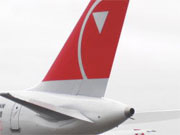August 19, 2005
 |
| Tom Gates was laid off from his management job with Northwest Airlines after the Sept. 11, 2001 terrorist attacks. (MPR Photo/Annie Baxter) |
St. Paul, Minn. — Northwest says since 2001, it has reduced its salaried and management workforce by 27 percent. The laid-off workers include people like Tom Gates.
Gates became a Northwest employee through the purchase of Republic Airlines in 1986. He worked in Northwest's computer services area, and was laid off a month after the Sept. 11, 2001 terrorist attacks.
Gates says that round of layoffs cut across a wide swath of the workforce, and included employees with varying lengths of service with the company. He says he believes the job cuts at that time were fair.
"I guess I did," says Gates. "While it hurt to leave after all those number of years, I felt like it wasn't that I was personally pointed out as someone to be laid off."
Gates says he sympathizes with the Northwest mechanics who may face layoffs. He knows how hard it is to find other work. It took him two years.
But Gates says when he worked at Northwest, his sympathy with union workers wasn't always reciprocated. He claims there was an "us vs. them" culture at the company, where the union lumped salaried workers like him in with the upper management -- even though he felt he had a lot in common with the rank-and-file employees.
"We were in that gray area in between. We weren't the ones that were out setting the absolute direction of the airline. We were like them, in the trenches, doing day-to-day work," says Gates.
Northwest declined to speak on tape for this story. But the company insists it has always taken the knife to management's throat before demanding sacrifices from lower ranking employees.
When cuts began in 2001, it says, salaried and management workers were the first to suffer layoffs. At the end of this month, those workers will have their defined benefits program frozen.
"It's something they can do without a whole lot of resistance. There's not a union there to protect management," says Bob Bruno, a professor of labor and industrial relations at the University of Illinois.
"It's not uncommon that the first step to wring out some kind of savings is to go after your non-union, exempt, white-collar workforce," says Bruno.
Bruno says cuts to management can send a signal to the unions that everyone is included in the reduction plan. But Bruno says cuts to management seldom serve their persuasive purpose. Unions typically don't trust the numbers.
And that's the case for Ted Ludwig, the head of the Twin Cities local of the Aircraft Mechanics Fraternal Association. He says he doesn't believe Northwest's claims about management reductions.
"They took cuts on top of raises, which wasn't reported. We know that from people that came from our ranks that went into management that showed us their paychecks," says Ludwig.
Northwest didn't respond in time for this story to a question regarding Ludwig's claim. But to at least one analyst, the whole notion of comparing management cuts to union cuts is flawed.
Michael E. Levine is a veteran executive of three airlines, including Northwest. He currently holds a research post at the New York University law school. Levine says airlines have to work harder to hold onto management.
"Management workers were hired in a competitive labor market, and paid just enough money to keep them from working somewhere else. The union members typically were hired according to contracts settled in the regulatory era, when airlines were protected," says Levine. "They typically are paid rather more than they can earn in comparable work, either at new entrance airlines or elsewhere in the labor market."
Levine says it's understandable that Northwest's mechanics think they should maintain their current pay. But he says, that's how everyone at the company feels. It's how he felt as a Northwest executive.
"Like everybody in the world, I thought I was underpaid. I've never known anybody who ever thought they were overpaid," says Levine. "I think I'm being realistic about the way people think about their compensation."
Negotiations between Northwest and its mechanics union continue Friday in Washington D.C.





